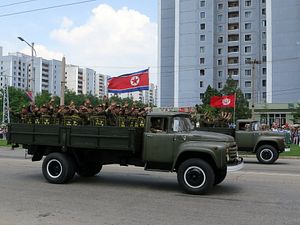On July 4, North Korea launched its first successful intercontinental ballistic missile (ICBM), the Hwasong-14. The missile touched down in the Sea of Japan after flying for 40 minutes, and traveling nearly 580 miles. Within hours, U.S. President Donald Trump took to Twitter, expressing his desire for China to “put a heavy move on North Korea.”
The comment is unsurprising given U.S. policy toward North Korea. Since assuming office, the Trump administration has consistently voiced its desire to move past the Obama administration’s policy of “strategic patience” in dealing with North Korea, yet little has changed in the current administration’s approach. The proposed solution remains the same: impose economic sanctions on the regime and pressure the Chinese government into using its economic influence to affect change. Unfortunately, this approach will not deliver the outcome the Trump administration desires as it lacks a fundamental understanding of the North Korean national policy of byungjin, the dual development of the national economy and nuclear weapons program. Economic pressure on North Korea will only accelerate the regime’s provocation cycle and embolden its intent.
Most of the discussion concerning U.S. policy toward North Korea revolves around the efficacy of the current approach. Instead of acknowledging that economic pressure has not, and will not, dissuade North Korean weapons development, most analyses point to a lack of effective implementation as the central issue. The problem, in this view, is not that policymakers have taken the wrong approach; the problem is that the approach has not been fully realized. And so the logic goes, the United States needs to put greater pressure on China to fully enforce UN economic sanctions in order to dissuade North Korea’s nuclear ambitions.
This mentality, though flawed, is understandable. The Chinese government has taken steps to pressure North Korea economically, but refuses to take any hardline actions that would threaten the viability of the regime. That fact played out over the first three months of 2017. Even as China cut its coal imports from North Korea in line with UN sanctions — a move that was met with international approbation — it increased its overall North Korean imports by roughly 18 percent. Similarly, implementing economic sanctions has proven a tough chore worldwide, as most nations lack either the resources or political will to enact them. The North Korean government employs a sophisticated system of front companies and non-state facilitators to increase its foreign interactions, circumvent UN sanctions, and maintain ties to the international banking system. This system of illicit legerdemain is so effective that a recent UN investigation concluded that “implementation remains insufficient and highly inconsistent.”
The issue for Pyongyang, however, is that the national policy of byungjin promises economic development in addition to nuclear weapons development. Due to its increased isolation, North Korea lacks the ability to create sustained economic growth, or even the necessary resources to provide for its socialist system. Any economic development that does occur is often tied to black market trade, which undercuts the central government’s development plans and prevents tangible success.
Byungjin has now become a self-defeating policy. As North Korea conducts tests in support of its nuclear weapons development, the international community responds with sanctions that further undermine the policy’s economic development. Kim Jong-un is forced to prioritize nuclear weapons development in order to save face and maintain credibility with the North Korean populace — or more specifically, with the Pyongyang elites that control the country’s ubiquitous defense and security services. Further economic pressure, either unilaterally imposed by China or applied through UN sanctions will only increase internal pressure on the regime and the resulting need for nuclear weapons development under the byungjin policy.
North Korea’s current provocation cycle has accelerated as a result of this pressure. Under Kim Jong-un, the country has conducted numerous missile tests — 10 of which have occurred in 2017 — aimed at developing the subsystems required of an intercontinental ballistic missile, as well as two nuclear tests aimed at creating a viable nuclear warhead. The Trump administration is correct in assuming that negotiations are the only acceptable recourse to denuclearize North Korea, but administration officials have failed to offer the regime sufficient incentive to come to the table. North Korea will refuse to participate in negotiations without significant economic and security incentives that satisfy the requirements of byungjin. Unlike his father, Kim Jong-un will not agree to negotiations and weapons testing moratoriums in exchange for food and economic aid. Doing so would be tantamount to publicly acknowledging economic failure under byungjin.
Successful negotiations will also need to appease North Korean security concerns. Pyongyang justifies its military and strategic weapons development in response to the “U.S. threat.” In order to justify the removal of its weapons program, there needs to be a proportionate decrease to the perceived threat. The Trump administration has limited options here. Decreasing either the number of U.S. service members stationed on the Korean peninsula or decreasing the number of bilateral exercises would require the approval of the new Moon Jae-in administration in South Korea, which is loath to show weakness this early in its tenure.
Ultimately, the Trump administration will need to chart a new course in order to counter North Korean nuclear aspirations. Policymakers need to account for the influence of byungjin and abandon their desire for increased economic pressure against Pyongyang. Further pressure will only strengthen North Korean resolve and create greater impetus for the development of nuclear weapons.
Captain Daniel P. Grant is a Marine Corps Officer assigned to U.S. Marine Corps Forces Pacific. He has participated in multiple exercises and bilateral engagements with the Republic of Korea. The views expressed in this article are those of the author and do not necessarily reflect the official policy or position of U.S. Marine Corps Forces Pacific, the United States Marine Corps, the Department of Defense, or the U.S. government.

































